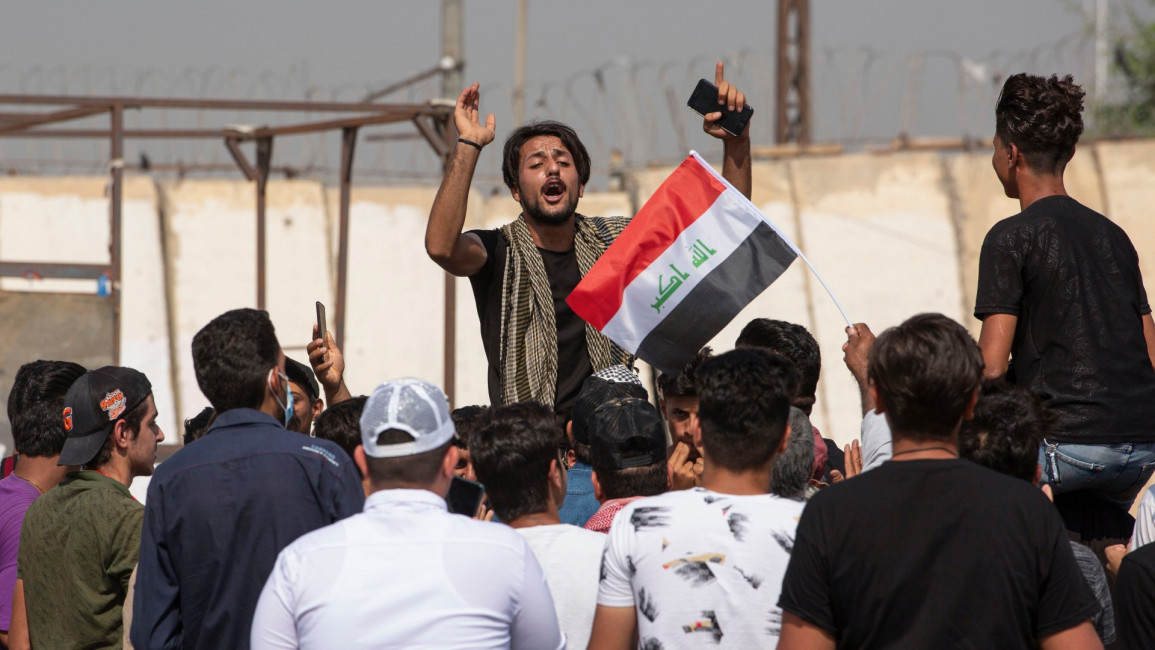Iraqis rally to revive year-old revolt against the system
Thousands of Iraqis took to the streets on Sunday on the first anniversary of a revolt against a political system failing to deliver basic services and against the growing influence of pro-Iran militias.
The mobilisation kept up the protest movement's key demand for the ouster of the entire ruling class accused of corruption and being beholden to neighbouring Iran.
"We want to achieve our objective of building a new Iraq," Ali Ghazi, a demonstrator from the southern city of Nasiriyah that has been also at the centre of protests, told AFP.
About 600 protesters were killed and 30,000 wounded in clashes with security forces in Baghdad and the south last year, before the movement launched last October lost momentum and then ground to a halt due to the coronavirus pandemic.
A campaign of targeted assassinations of leading figures of the revolt followed, with the United Nations pinning responsibility on militias.
The burgeoning protests helped usher in Prime Minister Mustafa al-Kadhemi in May, but he has yet to deliver on any major reforms.
A World Bank report says one in three young people is unemployed in Iraq, OPEC's second-biggest oil producer.
With lifeline oil prices plummeting, the knock-on effect has been brutal for the average Iraqi, with salaries delayed and basic services sorely lacking.
In a flat, technocratic speech on Saturday, the intelligence chief turned prime minister struck a tempered tone between appeasing protesters and warning against an escalation.
Kadhemi repeatedly urged security forces not to fire at demonstrators but also called on protesters to "respect the uniform".
Riot police clad in bulletproof vests, helmets and plastic shields were lined up Sunday near major bridges close to the Green Zone, the home of government offices, parliament and the US embassy.
Kadhemi’s influence is being tested against a backdrop of armed factions.
|
||
He also faces a rising tide of resentment from young protesters intent on breaking the status quo based on sectarian loyalties since the 2003 US invasion.
'Protesting despite threats'
On activist messaging boards online, protesters said they would ramp up their demands this year and head to the high-security Green Zone.
Military spokesman Yahya Rasool has urged crowds to stay put in nearby Tahrir Square, warning that moving outside the capital's iconic protest epicentre "was not in anyone's interest".
The Green Zone, a no-go zone for ordinary Iraqis, is separated by Al-Jumhuriyah bridge from Tahrir.
On the bridge, hundreds of protesters atop concrete barriers Sunday shouted slogans in memory of fallen "martyrs", waving Iraqi flags and portraits of those killed.
Security forces also sealed off other bridges over the Tigris River.
"We want to dissolve parliament, a transparent electoral law, a new law organising political parties and for the state to take control of the flow of arms," said lawyer Sajjad Salam, leading a group of demonstrators from the southern city of Kut.
Hussein Mortada from Amara, also in the south, said he was he was determined to take part in the revival of the so-called "October revolution" despite "threats from political parties and powerful local figures".
In his address to the nation, Kadhemi said parliamentary elections now scheduled for June 2021, brought forward partly in response to protesters' demands, would go ahead.
Iraq's parliament is stacked with pro-Iran blocs resistant to tangible political reforms, as debate on a new electoral law is held up.
Armed pro-Iran factions have accused protesters of being "agents" of the US "occupier".
Last week, the US slapped the Iranian ambassador to Iraq with sanctions, citing "terrorist" acts against its interests.
Tensions have been high since January when a US drone strike near Baghdad airport killed top Iranian general Qasem Soleimani and an Iraqi lieutenant, Abu Mahdi al-Muhandis.
About 90 rockets have since targeted the US presence in Iraq, with several claimed by pro-Iran armed groups.
Follow us on Facebook, Twitter and Instagram to stay connected



